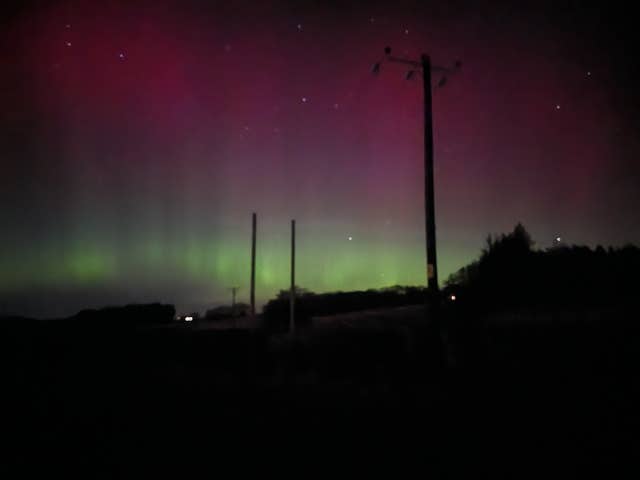Northern Lights likely to return tonight after stunning display photographed in Shropshire
The Northern Lights are set to be visible again tonight after a rare display over the UK wowed stargazers across the country - including in Shropshire.

A stunning display of the Northern Lights illuminated the skies of Britain and Ireland on Sunday with a dazzling show of shimmering greens, purples and pinks.
While Scotland saw the most impressive display, spectators across Shropshire shared their snaps of the spectacle.

The colourful aurora, created by high-speed electrically charged particles from space colliding with gas molecules in Earth's upper atmosphere, is typically visible near the Earth's magnetic poles.

However, occasionally it can be seen in the night sky over Britain, as it did on Sunday.

Spectators across the UK shared their sightings on social media, with some even reporting seeing the aurora as far south as Cornwall.
Rob Davies snapped the stunning sight as it illuminated the skies over Cressage.
Rob, who lives in the village and works for the Environment Agency, said: "I’ve been trying for years to see the Northern Lights in Shropshire and I use the AuroraWatch UK app to monitor solar activity.
"Getting clear skies and activity this far south is very rare this time of year so I couldn’t believe my luck when the alarm went off last night and I saw stars in the sky.
"I raced to my normal spot near Cressage with good clear views to the north and immediately knew it was happening as the sky was moving in a green hue.
"I used my iPhone and clear reds and purples began moving in the night sky - it was absolutely magical and I felt so privileged to be there.
"I used a 10 second exposure to really capture the detail of the display.
"Probably a once-in-a-lifetime experience for a Shropshire sighting like that.
"I'm so very lucky - although the solar forecast is still strong for tonight so you never know."
The Met Office confirmed on Sunday that a "coronal hole high speed stream" had combined with "a rather fast coronal mass ejection" leading to sightings across the UK.
And it added that it is likely to be visible in parts of the UK again tonight, on Monday, February 27.
Royal Museums Greenwich explains on its website that the lights are caused by solar storms on the surface of the sun giving out clouds of electrically charged particles which can travel millions of miles and collide with the Earth.

Most particles are deflected away but some are captured in the Earth’s magnetic field and accelerate down towards the north and south poles, colliding with atoms and molecules in the Earth’s atmosphere, according to the observatory.
The lights are the product of this collision between atoms and molecules from the Earth’s atmosphere and particles from the sun.

In November last year, strong light displays were witnessed across Scotland.
A Met Office spokesperson said the rare sightings of the aurora borealis further south in the UK on Sunday night were due to the “strength” of a geomagnetic storm and the “strip of cloudless skies” in southern regions.





